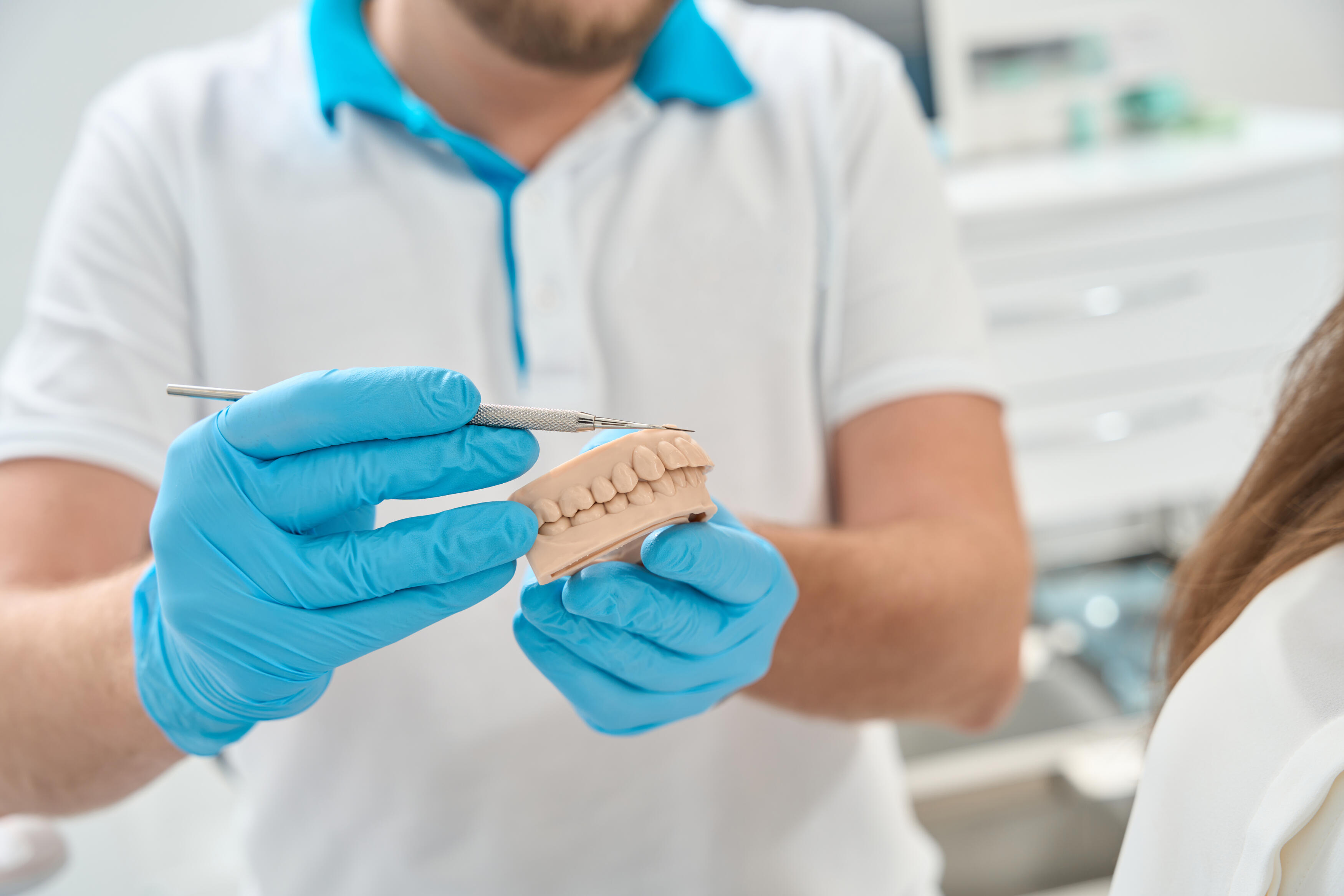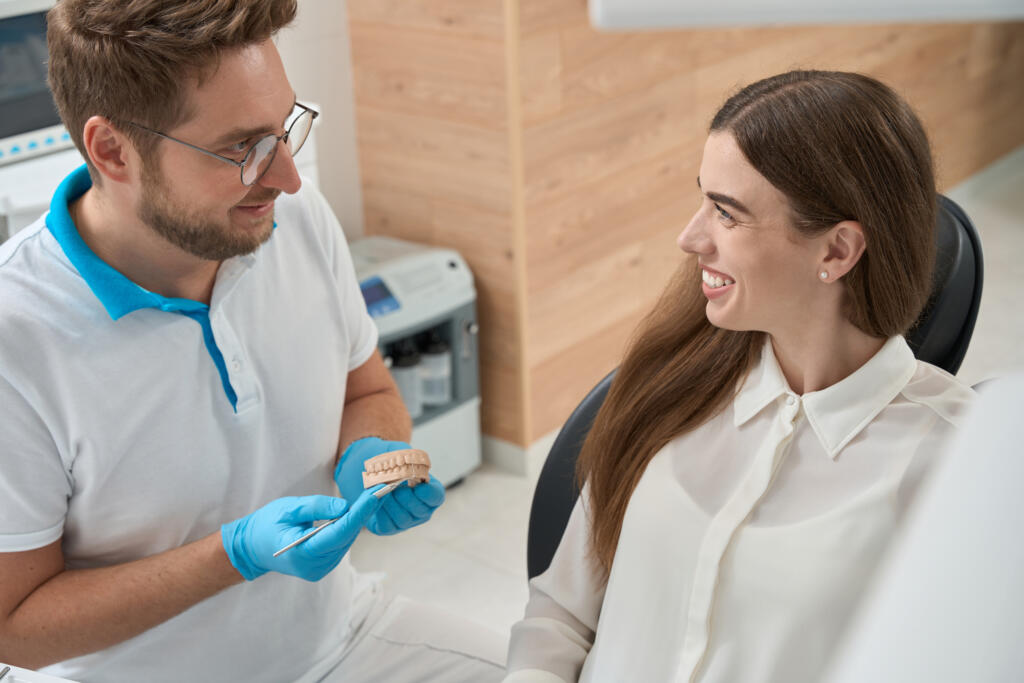
How To Remove Plaque From Dentures Instantly
Plaque deposits are a natural phenomenon that are impossible for anyone to avoid. While plaque present on natural teeth is often difficult to access, denture wearers do have the advantage of being able to remove their dentures in order to clean and erase plaque that accumulates on their dentures.
Still, denture wearers want to know how to remove plaque instantly from dentures for fresh breath and improved health. Today, we are going to discuss this topic and answer some of the questions that you may have.
What Is Plaque?
Dental plaque is a bacterial film that forms and grows on surfaces within the mouth. It is a sticky, colorless substance that can harden with time, forming tartar that is often brown or pale yellow in color and is particularly difficult to remove. It is commonly found
- between the teeth,
- on the front of teeth,
- behind teeth,
- on chewing surfaces,
- along the gumline, and
- even below the gumline.
Plaque and tartar are not limited to natural teeth; they also form on dentures, making them appear dingy and contributing to bad breath.
Can You Avoid Plaque Altogether?
The truth is, you can’t. How to remove plaque from dentures instantly or avoid plaque altogether just isn’t possible or realistic when you are dealing with a film that is constantly forming as a byproduct of the naturally-occurring bacteria present in your mouth.
You can’t stop the process from happening. But you can control it and prevent the formation of hardened tartar altogether by removing plaque with daily denture cleaning.
How to Remove Plaque Safety

Good plaque control begins with a home care regimen that ensures the complete disruption and removal of plaque on a daily basis before it has the opportunity to accumulate.
In addition to improving the appearance of your dentures, thorough denture cleaning also serves to lower the count of harmful bacteria that can contribute to bad breath, inflamed oral tissues, gum disease, as well as respiratory infections. Plus, your remaining natural teeth also require plaque removal to keep remaining teeth and gums healthy.
Gather Needed Materials
Basic denture care doesn’t have to be elaborate or expensive. The key component to any cleaning and maintenance routine involves using a soft toothbrush to remove the plaque buildup and disrupt bacterial growth before it has the opportunity to proliferate freely.
This includes getting in the habit of good home care and setting time aside every day to take care of your dentures.
Prep Your Workspace
Generally, the best place to clean dentures is near your bathroom sink. Because dentures can easily slip out of your hands and be damaged upon impact with a hard surface, it is best to clean dentures over a basin of standing water that will cushion the blow should the dentures be dropped.
Alternatively, cleaning dentures over several folded towels works well.
Soak Dentures
Soaking dentures in a container of cool water or effervescent denture cleaner for a few minutes can loosen debris and dilute the plaque film, making it easier to remove.
While using denture cleansers is often promoted in advertising as the only denture cleaning solution, relying on these products alone is not sufficient to prevent buildup that causes tartar formulation and discoloration.
Brush as Needed
The second step to maintaining clean dentures involves using a soft-bristle denture brush with liquid soap to loosen debris and disrupt plaque formation. The scrubbing action of the brush makes the film easier to rinse away completely and allows you to sanitize your dentures prior to the next time that you wear them.
As dentures age, pitted acrylic and micro-cracks often develop, trapping remaining plaque deposits in locations that only a brush will be able to access and remove.
Soak Overnight
Many denture wearers prefer the ease and fresh feeling of soaking their dentures overnight in effervescent cleansers. While this is a great supplement to brushing, it is not advisable to trust that cleaners alone will do an adequate job of keeping your dentures free from plaque and well-maintained.
What Not To Do
It is never recommended to wear dentures to bed. As you sleep, saliva production is naturally reduced, allowing plaque to form at a more rapid rate. In addition, wearing dentures 24/7 never lets the sensitive tissues inside of the mouth rest or be exposed to air. This can contribute to additional bacteria and yeast formation that can cause dentures to make your mouth sore or cause infection.
When dentures are not being worn, always keep them in a sealed container of clean water out of reach of children and pets. Dentures that are allowed to dry out can become brittle, making them more prone to breakage. Dry dentures can also become populated with germs that allow bacteria and fungi to spread rapidly. Denture wearers who leave their dentures accessible to pets often find the dentures broken beyond repair, as pets love the scent of their owners on the acrylic and will chew on the denture material.
If you notice your dentures becoming stained or discolored despite routine cleaning at home, don’t delay getting help from a dental professional. Denturists use an ultrasonic bath to remove tartar and set-in stains from dentures.
They can also evaluate your dentures for cracks or flaws in the surface that may be making it more difficult for you to care for your dentures at home. Sometimes minor denture repair is the best solution for dentures that are more cleansable.
So, How Do You Really Remove Plaque From Dentures Instantly?
You can’t. There is no way for anyone, including dental professionals, to remove plaque from dentures instantly without effort. But you can remove plaque before it becomes an issue by following a daily denture care routine. Fortunately, denture maintenance can be performed in almost any bathroom.
This can begin with something as simple as removing and brushing your dentures with soap and water after meals, even when you are out and about. Your denture professional can help you establish a good routine that works with your busy lifestyle.
Clean Dentures at European Denture Center

Cleaning dentures isn’t about perfection. After all, no one can prevent plaque from forming on dentures. The key is to do an adequate job of removing plaque consistently every day in order to keep your dentures from becoming a petri dish of bacteria that affects your appearance and your health.
The professionals at European Denture Center will work with you to ensure the beautiful smile that you deserve with our stain- and odor-resistant dentures. The next step to a great denture experience begins with a free consultation appointment with one of our dental professionals!

